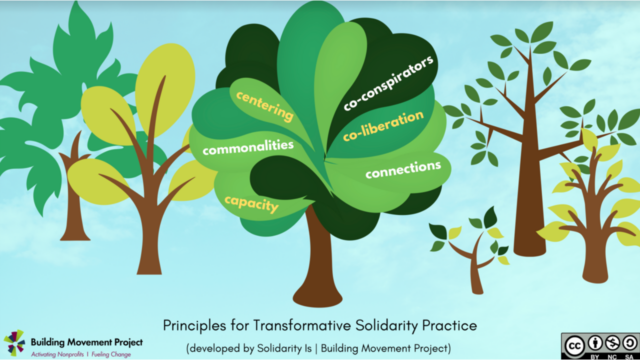
Over the past year, the Proteus Fund has been working with grassroots organizations and philanthropic leaders to better center and ultimately support “solidarity’ as a value and strategy for moving towards an inclusive, representative democracy. While many conceptually support the idea of solidarity, many fairly ask what solidarity really means in practice. This question and answer with Deepa Iyer, who is one of the foremost practitioners and teachers on solidarity, attempts to answer these and other questions.
Solidarity is often perceived as short-lived and reactionary actions responding to a crisis moment. My work with coalitions and networks has led me to understand that solidarity is a set of practices grounded in trust and motivated by meaningful connections to others.
At SolidarityIs and Building Movement Project (BMP), we invite people and organizations to imagine solidarity as a set of practices. For example, practicing solidarity means that we center the needs and demands of those affected by inequity and injustice, even if we might not fully understand or even agree. It means that we think of ourselves not merely as allies but as thoughtful and accountable co-conspirators who show up time and again, who take risks, and who use our privilege and power for the common good. It means that we look for commonalities and connections between communities and issues without flattening, comparing, or equalizing them. And it means that we build our capacity as individuals and organizations to take the time to build relationships and foster trust, the cornerstones of solidarity practice. When we are more intentional about how we practice solidarity, we can move from a transactional to a transformative approach.
The below image shows how these various practices are intertwined and interwoven.

The word “transformative” is important because it signifies a change, an evolution, and a maturation, both in oneself and one’s organizational practice, as well as in the broader cause. For example, transactional solidarity happens when I go to a march to support an action organized by my city’s Black Lives Matter chapter, and then return home to post tweets with the hashtag #BlackLivesMatter. There is indeed validity in my action: I was motivated to do something about anti-Black racism in my town; my presence at the march made it a more robust one; and I let my networks know that I care, and they should too.
But transformative solidarity could stretch me – and the collective cause – further. Here’s what that could look like: I persuade two friends to go to the march with me. I engage in a personal educational process to learn about the historical and ongoing effects of white supremacy on Black communities. I organize a session in the race/faith community I belong to about how we can eliminate anti-Black racism within our own spaces. I build relationships with Black Lives Matter leaders in my city to extend my support. I show up time and again for events, marches, and meetings. Meanwhile, the Black Lives Matter chapter has been continuing its work to deepen its base and to hold workshops and forums that center affected communities. With the support of a diverse range of stakeholders, the chapter successfully moves a policy platform forward over time.
The above example can also be used for organizational practices. Due to capacity challenges, organizations might only have space and time to engage in transactional solidarity efforts such as signing onto a statement or showing up for one rally. When organizations reflect on their own solidarity values, they might take a number of actions internally and externally. For example, if an organization made an explicit commitment to address anti-Black racism as a value, it could practice this value by seeking out Black-owned businesses as vendors for its events. Or the organization could set aside a portion of donations received and allocate them to Black-led partner groups. These are examples of how organizations practice their solidarity values to bring about internal and external changes.
In talking with organizations about what stymies their solidarity practices, a few themes come up time and again. For example, movement and nonprofit leaders observe that while solidarity is an integral part of their mission, they have little, time, or dedicated staff to maintain partnerships. We also hear that organizational leaders are worried about the negative dynamics within movement culture that make it difficult to build trust and connections. Additionally, the demands set by philanthropic institutions often lead organizations to collaborate on short-term campaigns without the space and time for deeper relationship building.
To overcome these barriers, we must all become more intentional and thoughtful about our solidarity practices. For groups, this could mean developing solidarity values that are embedded into mission statements and allocating resources towards staff and programs that weave connections between partner groups. For the philanthropic sector, it could mean resourcing opportunities for community leaders to be in regular conversation with one another, and providing support for long-term collaborations rather than short-term partnerships.
Deepa Iyer is Senior Director of Strategic Initiatives at the Building Movement Project where she develops resources and facilitates networks in order to advance solidarity and social change. She hosts a podcast called Solidarity Is This. She is the author of Social Change Now: A Guide for Reflection and Connection, and We Too Sing America: South Asian, Arab, Muslim and Sikh Immigrants Shape Our Multiracial Future.